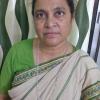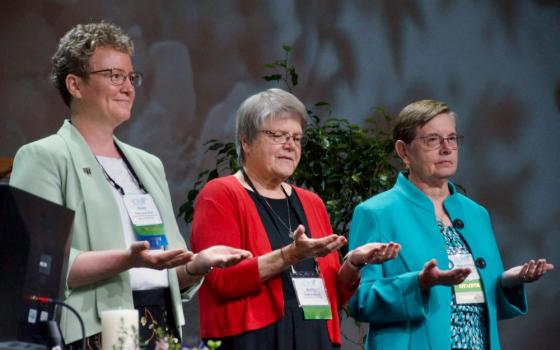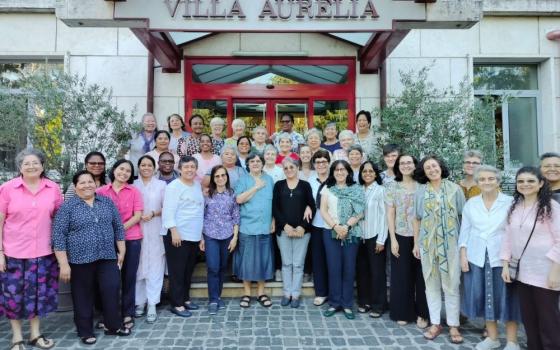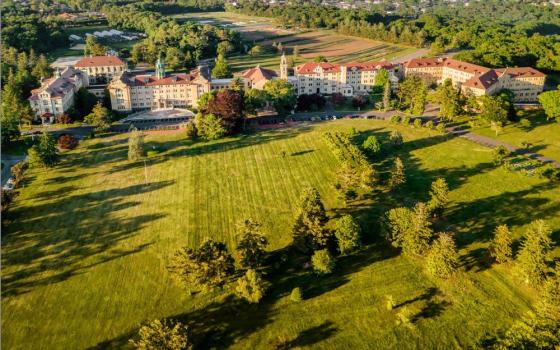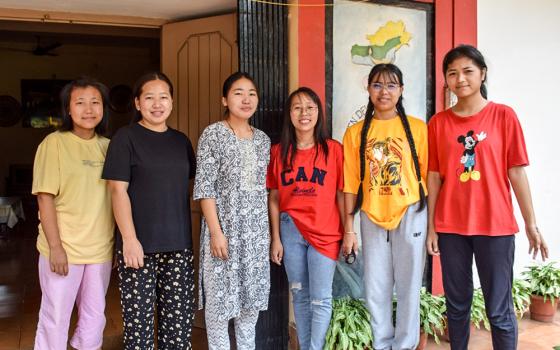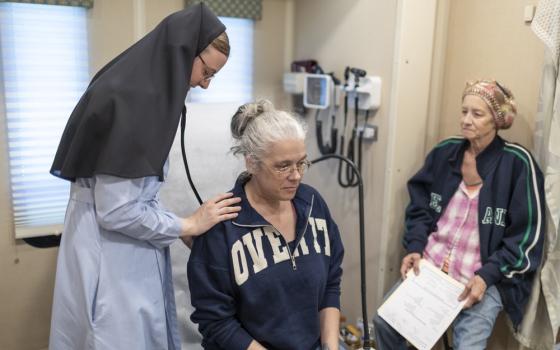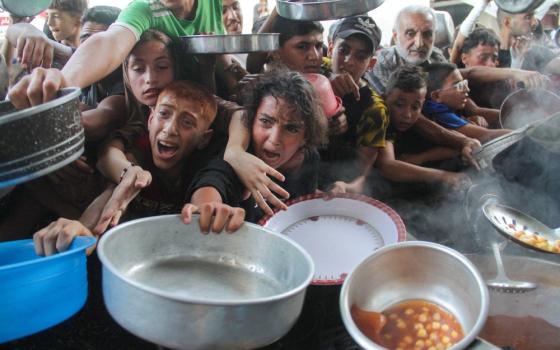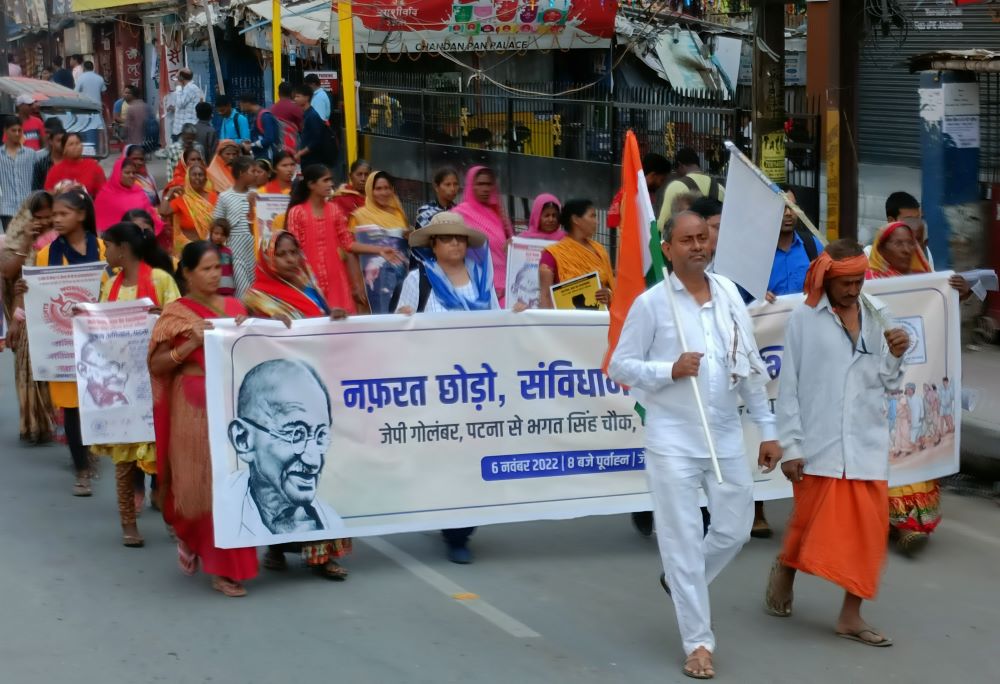
Members of the Bihar Citizen's Forum march for peace and unity. (Courtesy of Dorothy Fernandes)
India has changed a great deal over the past few months. When the reins of governance moved to the Bharatiya Janta Party, or BJP, people welcomed the change, but gradually the party's hidden agenda is becoming evident. The hidden agenda seems to be suppressing the Congress party, to use all opportunities to tarnish the image of its key leaders. The fanatics have been active in distorting history, even removing important historical facts from textbooks to erase the truth from the minds of the young generation.
It all began when the BJP came to power and started stirring up the winds of fascism. Those who were at the center of the ruling party failed to watch closely. Most disturbing to me was when these fascists began to honor Nathuram Godse, the murderer of Mahatma Gandhi. It is unbelievable that a ruling party could go to such an extent.
The government has violated freedom enshrined in the Indian constitution. The basic is freedom to practice our religion, freedom to raise our voice against violations of human rights. Today there are many innocent people who have been booked under the Unlawful Activities Prevention Act, or UAPA. Jesuit Fr. Stan Swamy died in police custody in 2021 after an arrest broadly thought to be for fabricated charges under the UAPA.
In another glaring example, a high-ranking Indian Police Services officer was jailed. A Gujarat court in June 2019 sentenced Sanjiv Bhatt to life imprisonment in a custodial death case dating to 1990.
Advertisement
Anyone who dares to speak the truth or opposes the government is harassed. Things have reached such a point that anyone holding a criminal record gets a clean record if they join the ruling party. Fear is being instilled in the hearts and minds of the citizens, who choose to remain silent in the face of these atrocities.
There are many divisive, deceitful programs introduced. Each tried to lure the people; but since India is such a tolerant nation, the majority of our people didn't speak up. Over the years the central government has crossed boundaries — removing socialist thinking from school books, mob lynching, denying dissent —to attack the minority.
Both civil society and people's organizations have been analyzing all these moves, but the bhakts (devotees) have been unaffected. In very recent times, because of the silence of the majority, these officials have gained the upper hand. They have been spreading hatred, sowing the seeds of suspicion, mistrust and enmity among youth and children.
Now, children do not mingle so easily with each other or participate in the festival celebrations. It is a challenge to run educational institutions or work among people. We do not know when the chord of enmity will surface. The future of any nation or institution is its youth. Children should not be involved in politics, as they are very vulnerable and not mature enough to make decisions for themselves.
As the watchdog within, civil society and people's organizations hold the firm belief that the ethos of this country — its diversity — has to be preserved; many groups across the country have responded positively to this challenge. Based on the two Universal Truths, every Indian believes God or the Supreme Power is in everybody, and everything is interconnected at a deeper level. The basic unity of life cannot be broken. Love and sacrifice therefore emerge as the only means for a meaningful living. Based on this holistic vision, Indians have developed their work ethos of life, believing all work — physical or mental, managerial or administrative — must be directed toward a single purpose.
Divinity of a human being is not merely a notion, but a truth that can be experienced in the stillness of the mind. This has paved the way to keep intact our constitution, which gives us the responsibility to live in harmony with our diversity.
It is imperative that every effort is made to regain our lost value of peace and harmony. Though we profess to be a tolerant society, it is evident today that we no longer are able to hold this value. Even if a vehicle accidentally hits another vehicle, tempers rise high. Giving a word of caution to some erring person is so unacceptable, violence breaks out and tempers rise high. Street fights have become a common sight, with onlookers watching but not trying to separate them or become peacemakers.
On Nov. 6 in Patna, Bihar, under the banner of civil society, we in the Bihar Citizen's Forum undertook a march of 20 kilometers from the famous Gandhi Maidan park to Patna city. The march began with women in the forefront, men and a good number of youth, some on bicycles. Marching through the main streets of the city, we spread the message to live in unity.
After about 7 kilometers, we stopped to rest and refresh ourselves. As we moved ahead toward the city, groups of people welcomed the marchers with water, biscuits and tea. As we addressed the gathering, passersby stopped to read the banners. Pamphlets were distributed and the message was loud and clear. As we marched, slogans, songs and banners drew people's attention.
These small initiatives are important as they spread the word among people, invite them to stop, to listen, to read. It is our hope that this will awaken our people and that the message of harmony, unity and nationhood will spread to the least, the last, the lost.
Participating in this march gave me a sense of building our nation. It brought back memories of our freedom struggle from the British and those great women and men who marched for freedom. Indian society is undergoing a second freedom struggle, challenged once again to preserve the country's ethos and rich diversity, and to uphold the values enshrined in our constitution.
It was quite striking that it was the minority communities who put up stalls and offered the marchers refreshment, while the dominant culture was so indifferent. We have become so divided that we may act only when something hurts us personally; I am afraid if we do not act collectively today, we are doomed to be destroyed. Though we were a small band of marchers, I believe change always comes with a small group and this belief will see us through.
